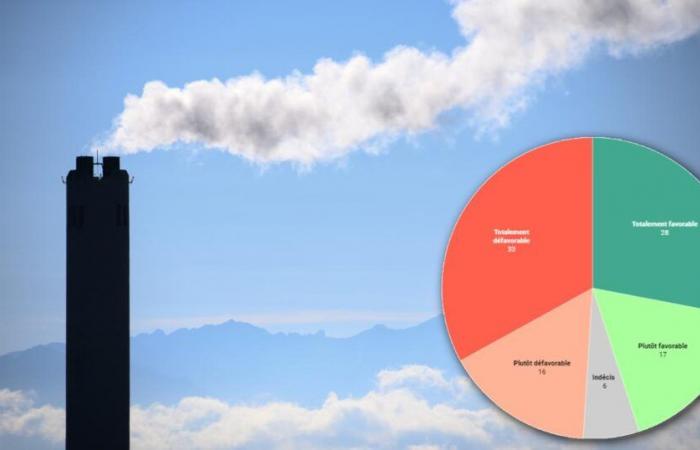
A third of the Swiss population would currently reject the initiative of the Young Greens for environmental responsibility, which will be on the agenda of the votes on February 9, 2025, according to a first survey by the gfs.bern institute published Friday on behalf of the SSR. However, around 40% remain undecided.
“In this early phase of the campaign, the stage of opinion formation seems moderately advanced,” writes the gfs.bern institute. According to this first survey, a relative majority of 33% definitely rejects this object, while 28% say they are firmly in favor of the text. The Young Greens’ initiative demands that the Swiss economy, including imports, reinsert itself within the earth’s natural limits within ten years.
Among those undecided, 17% are “rather for” and 16% “rather against”. Finally, only 6% of respondents say they are completely undecided. “This is a snapshot about seven weeks before the vote, and not a forecast,” specifies gfs.bern.
External content
This external content cannot be displayed because it may collect personal data. To view this content you must authorize the category Infographics.
Accept More info
“Given the early stage of the campaign and the lack of media coverage, these values are likely to be surprising,” comments the institute. “They signal a fundamental reflex of defense towards the project” which does not bode “no good” for the initiative (see box).
Traditional divisions
The divide between the two camps reflects a rather traditional partisan opposition on environmental issues: supporters of the Greens, the PS and the Green Liberals (PVL) quite clearly support the initiative, while the electorate of the others parties reject it unequivocally.
The institute notes a divide within the PVL between the base and the party’s elected officials. While the Green Liberal delegation to the National Council voted against it en bloc, the initiative enjoys broad sympathy among its electorate.
External content
This external content cannot be displayed because it may collect personal data. To view this content you must authorize the category Infographics.
Accept More info
Furthermore, the initiative receives a majority of approval among women, 18-39 year olds, the precarious population and urban residents. There is even a real gap widening between the sexes: 56% of women approve of the initiative while 59% of men reject it.
External content
This external content cannot be displayed because it may collect personal data. To view this content you must authorize the category Infographics.
Accept More info
Another striking indicator: approval decreases in a fairly linear fashion with increasing income: thus, households with low income mostly approve of the initiative, while those with more than 7,000 francs are a majority who reject it.
External content
This external content cannot be displayed because it may collect personal data. To view this content you must authorize the category Infographics.
Accept More info
A linguistic divide is also emerging: French-speaking people (55% yes) and Italian speakers (52%) are rather in favor of the text while German-speaking people reject it (52% no).
Well-established arguments
The different arguments linked to voting preferences are already clearly identifiable. If a majority of around two thirds of voters recognize the existence of overconsumption of resources and the need to reduce Switzerland’s environmental impact on its territory as well as abroad, two thirds also see disadvantages in the implementation of the initiative, in particular a fear of seeing prices increase in Switzerland.
Furthermore, 65% believe that bans and regulations risk weakening the Swiss economy, and 61% fear that the initiative will force drastic renunciations and that it will massively lower the comfort of life in Switzerland.
Little interest at the moment
Finally, at present, interest in this vote is low: only 35% of respondents affirm their desire to take part in the vote. This is significantly below the average of recent years (47% between 2011 and 2023).
External content
This external content cannot be displayed because it may collect personal data. To view this content you must authorize the category Infographics.
Accept More info
According to gfs.bern, the percentage is expected to rise as voting Sunday approaches. But according to its projections, it reflects a participation which promises to be slightly below average.
Pierre Jordan





